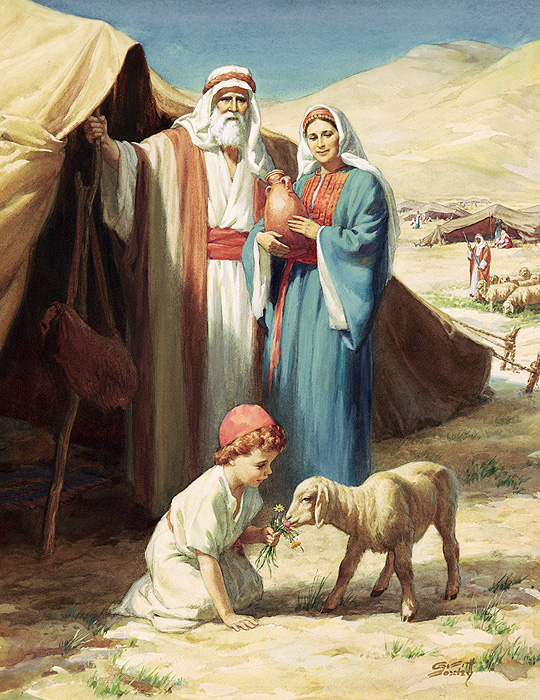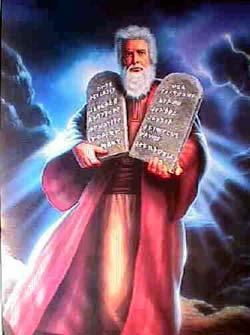LET YOUR HEART BE BROKEN
From the late years of the Roman Republic to the end of the Roman Empire, Roman statesman and philosophers lamented the rampant debauchery and moral degradation of the Roman people. Unlike other empires that preceded them, Rome did not fall so much through conquest by another group; it collapsed from within largely because of its own wickedness. Stated bluntly, the Romans to a great extent destroyed their own empire by their own unchecked depravity. The religious paganism of ancient Rome lent itself to the decadent behavior for which Romans are now so well known. But it should have been different in Israel and Judah. For centuries God sent prophets as His own representatives to rebuke His people for their sinfulness. One prophet after another called the people back to covenant faithfulness, but usually the prophets were ignored. Jeremiah rebuked Judah for some of the sins their pagan neighbors committed. Unlike the pagan people who later lived in the Roman Empire, Judah knew exactly what to do to break the cycle of sin and corruption- return to God. They had an obligation and a privilege to live the way God revealed in the Sinai covenant. This lesson considers God’s love for rebellious people and various responses people have when confronted with the truth of God’s word about how they live. So this is one of the real reasons we study the Old Testament and keep hearing how Israel keeps ignoring God. It should tell us today that God loves us and is patient with us, but He wants us to respond to Him and not keep ignoring Him.
Read Jeremiah 8:4-7 See the Problem
These focal passages are part of the larger section (7:1-10:25) that recounts the prophet’s temple sermon and other messages about God’s coming judgment on Judah. These verses leading up to 8:4 describe various sins Judah had committed and God’s account of those sins. Judah’s confidence and security were misguided, based on the temple being the Lord’s dwelling place. But God declared He would destroy the holy city and the temple, just as He had Shiloh where He first dwelled among them in the land of Canaan. Further, Judah had broken numerous commandments. This resulted in God’s command to Jeremiah not to pray for them. His judgment would fall on them without fail (7:1-20). Verse 4 begins the Lord’s message to Judah through Jeremiah that continues to the end of chapter 10. The people had fallen down spiritually but still were lying on the ground; they had moved away from the Lord but hadn’t returned. Then in verse 5 come two more questions. The first question speaks of the people in Jeremiah’s day; the second emphasizes that God’s people had made abandoning Him a habit. Jeremiah was not the first prophet God sent to His rebellious people, but Jeremiah was the last before the exile. Then God partially answers these two questions with the last part of verse 5- “They take hold of deceit; they refuse to return.” This is a reference that the Kings of Judah often were deceitful and many never repented
When people fall down or realize that they are headed in the wrong direction, it only makes sense for them to get up or change directions. But as God watched the nation, he saw people living sinful lives by choice, deceiving themselves that there would be no consequences. They had lost perspective concerning God’s Will for their lives and were trying to minimize their sin. What are some of the social indicators we see today that indicate when people have fallen down or are heading in the wrong way?
Ironically, though the people would not listen to God, He had been listening to them: “I have paid careful attention”. God mentioned three things His people were doing that displeased Him. First, “They do not speak what is right”. Instead of listening to God, they listened to false prophets and their own ideas. Second, “No one regrets his evil, asking,, What have I done”. Insensitivity to God’s word inevitably brings insensitivity to sin. Third, “Everyone has stayed his course like a horse rushing into battle” with no concept of the dangers that lay ahead. Despite God’s warnings, the people of Judah continued in their wicked ways. They should have known better for they knew the Mosaic Law and He uses the reference to many different kinds of birds to say that even they were aware of the “seasons” and requirements.
Read Jeremiah 8:8-13 Avoid Superficial Responses
Humans have a tendency to find all manner of excuses for their sins. Verses 8-13 expose the lack of concern Judah’s people had for their sins. They had a false confidence in their relationship with God that had to be exposed before they could repent. This is still true today; we must realize we are sinners and seek forgiveness. Verses 8-9 are followed by a censure of the priests and the people for their false optimism and shallow view of morality, with an appropriate fate forecast for them in verses 10-12. These three verses are duplicated in 6:12-15 but they probably were inserted here to bring together the three religious groups responsible for much of the evil of the times. These Scriptures reaffirm the arrogant self-opinion of the professional groups and shows that the source of their authority for thinking they are wise stems from their vocation.
The fact of the matter is quite otherwise: You scribes are unwise and the law of Yahweh is not with you. The scribes were ancient lawyers and, as such, were interpreters of the law whether religious, civil, or criminal. Law is one thing, interpretation is quite another. Throughout recorded history the law courts have been tainted with perennial guilt. By an addition here and a deletion there they have perverted the law (religion/tradition) into a lie (the same kind of charge in Matt. 15-3 and Mark 7:8-13. In Romans 1:22, Paul phrases it “Professing themselves to be wise, they became fools, and changed…”. Here the scribes rejected the law of Yahweh, which was ultimate wisdom, and they made up their own law from their foolishness.
Verse 13 illustrates the fragmentary nature of the writings of Jeremiah. It hardly agrees in subject with that which precedes or follows. It is an expression of the pathetic disappointment of Yahweh to have found no fruitage in His vineyard (compare Isa. 5:2, 4; Mark 11:12; Luke 13:6) or His fig tree, even worse, the leaves were withered and the investment diminished. Naturally it does have reference to Yahweh’s disappointment with the behavior of the Judeans. God would judge Judah harshly and this judgment would not be piecemeal or involve just a small group of people. It would be devastating and total destruction of the nation- not even plant life would be spared. It would even end in the destruction of the temple and the holy city.
Read Jeremiah 8:18-9:1 Reflect God’s Broken Heartedness
The tone changes in verse 18. We see throughout the words and emotions of God’s prophet, Jeremiah, God’s own tender attitude toward His people whom He was force to punish because of their wickedness. The Lord who takes no pleasure in the death of people (Ezek. 18:32), also takes no pleasure in the devastation of Hid people and their land. In verses 18-19, Jeremiah is pleading with God to the people of Judah. However, before moving from verse 19, it should be noted that this verse speaks as if the people of Judah were already in Babylon: “Listen- the cry of my dear people from a faraway land…”. Upon arrival in Babylon (much later), the captive people of Judah lamented that their God must have forgotten them, wondering where their great King was. This may indicate that by his pleading, Jeremiah knew it was a forgone conclusion that God would permit the exile. Verse 20 continues this thought as it tells us what the people will face and they “have not been saved”. In verses 25:11-13; 29:10, Jeremiah also tells the people they would be exiled for 70 years– not just six months.
The words in verses 20-22, vividly portray Jeremiah’s emotion as he watched his people reject God. He responded with anguish to a world dying in sin. We watch the same world still dying in sin, still rejecting God. But how often is our heart broken for our lost friends and neighbors, our lost world? Only when we have Jeremiah’s kind of passionate concern will we be moved to help. We must begin by asking God to break our heart for the world He loves. Jeremiah asked a question about Gilead, a territory located east of Jordan famous for its healing medicine. Jeremiah often used medical terms to express religious ideas (15:18; 30:15), a deep insight into the psychosomatic nature of mankind. The positive side of medicine is employed with these affirmations: There is balm in Gilead with healing properties; there is a physician available to apply medicine to the wounds; the health (literally, proud flesh) should have been restored. Yahweh’s people had a serious wound. Jeremiah was saying the medical facilities and persons administering the medicine were there. So why weren’t the people healed? Like the apostle Paul (2 Cor. 2:4; Phil. 3:18), Jeremiah also lamented the unbelief of his people. They both remained faithful to declare God’s word. We should be broken-hearted over our own sin-sick country and the entire world that does not know God, and we should be faithful in doing everything we can to reach those who are still in unbelief.



